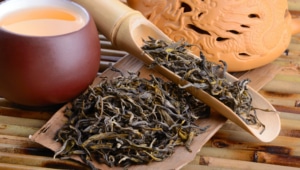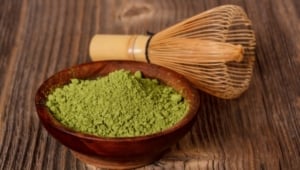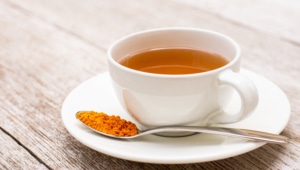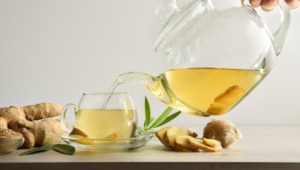5 Health Benefits of Matcha Tea & 3 Tips
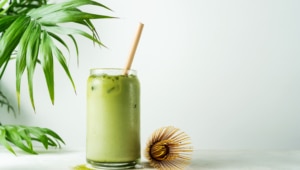
If you’ve ever had matcha tea, you’ll know it for its vibrant color, earthy smell, and luxurious, somewhat sweet and floral flavors. In this article we explore the many health benefits of matcha, its nutritional facts and ingredients, and even any potential risks.
But why is matcha tea so good for you, and what makes it different from green tea? Once you’re ready to get into making matcha at home, we’ll also give you some hints and tips about preparing it, and what else you can make with matcha.
Interesting Facts about Matcha: The Japanese Green Tea

Interesting Facts about Matcha: The Japanese Green Tea
There are many interesting facts about matcha tea, from its origins to its preparation, and its many benefits. Matcha tea is one of the oldest tea preparations we know, and is still popular across the world.a
Origin and Where Matcha Tea Comes From

Origin and Where Matcha Tea Comes From
Matcha tea originated as fairly regular green tea. A Zen Buddhist monk studied in China and returned with tea seeds.
He introduced the preparation of this new beverage as “the way of tea.”
The idea behind this was to prepare tea perfectly, to show your devotion and honor the beauty found in a world that is otherwise very flawed.
Ingredients in Matcha Tea

Ingredients in Matcha Tea
Matcha is made with tencha. Tencha is crafted by first growing tea leaves from the Camellia Sinensis plant grown without direct sunlight.
The tea is then carefully steamed, dried, deveined and destemmed, and ground to a very fine powder using a stone mill.
Tencha literally refers to the words “grind” or “mortar”, which is how matcha is processed. Interestingly, you can buy tencha as whole leaf tea, too, though most of it ends up as matcha powder.
What Matcha Tastes Like

What Matcha Tastes Like
Matcha has many different descriptions when it comes to taste: it’s earthy, sweet, somewhat creamy, slightly bitter, and more. It doesn’t offer the same sort of divisive flavors of regular green tea, which can be a little pungent. Matcha is more sweet, floral-like, with an almost umami taste.
Matcha Green Tea Powder

Matcha Green Tea Powder
By definition, matcha is a powder which has been finely ground from tencha tea leaves.
If you’re buying matcha powder for the first time, you can follow a simple rule regarding quality: the more finely ground, the better-quality matcha tea you’re getting.
The finer your matcha is ground, the easier it will be to blend it with water, resulting in a more flavorsome, satisfying beverage.
Does Matcha Tea Have Caffeine?

Does Matcha Tea Have Caffeine?
Matcha tea contains caffeine, though much less than coffee and more than regular green tea. While an 8 fl oz cup of green tea will contain around 28 milligrams of caffeine, matcha will contain 70 milligrams.
The same size cup of coffee will contain an average of 95 mg of caffeine, though some coffees will have as much as 140 milligrams.
Where matcha really shines is its content of minerals and vitamins, as well as vital amino acids that promote relaxation.
Nutritional Facts and Calories of Matcha Tea

Nutritional Facts and Calories of Matcha Tea
Eight fluid ounce of matcha tea contains around three calories when prepared without the addition of milk, sugar or honey.
One gram of matcha tea powder contains an impressive amount of vitamins, minerals, and more:
- 306 mg of protein
- 272 mg of amino acids
- 50 mg of lipids
- 27 mg of potassium
- 2.3 mg of magnesium
- 4.2 mg of calcium
- 0.062 mg of zinc
- 3.5 mg of phosphorus
- 0.17 mg of iron
It also contains vitamin A, vitamin B1, vitamin B2, vitamin B6, vitamin C, E and K.
Health Benefits of Drinking Matcha Tea

Health Benefits of Drinking Matcha Tea
Having read about the many nutrients present in matcha tea, it’s clear that matcha is great for you. This vibrant green tea offers numerous health benefits. Below are some of the most important ways in which you’ll benefit from adding matcha to your everyday diet.
Contains Antioxidants

Contains Antioxidants
Both matcha and its more commonly enjoyed cousin green tea are very high in antioxidants.
This includes catechins, which are said to lower your risk of developing certain diseases including some cancers. Catechins are also said to prevent cell damage.
Promotes a Healthy Heart
According to a number of studies, matcha tea is good for your heart. The high levels of antioxidants present in matcha green tea can help prevent blockages and reduce cell damage. This makes matcha a great addition to a heart-healthy diet plan.
Boosts the Way Your Brain Works

Boosts the Way Your Brain Works
Matcha’s many nutritional benefits include a nootropic-like effect on your memory, attention span, motivation, concentration, and relaxation.
Matcha is actually said to help make your brain healthier by increasing optimal circulation. The presence of l-theanine, a type of amino acid, means matcha is also helpful at reducing anxiety.
Offers Cancer-Fighting Properties
Matcha is helpful at fighting free radicals and protecting against cell damage. In animal studies, it was shown that it may inhibit tumors from growing and multiplying.
Paired with its relaxing effects on your brain and overall boost to your health, this makes matcha the ideal accompaniment to any cancer treatment.
Protects Your Liver

Protects Your Liver
Some studies suggest that matcha tea may decrease your risk of developing liver disease as well as preventing damage to your liver.
While these studies appear to be in the early stages, they seem to link back to the fact that matcha is rich in antioxidants and offers a sort of cleansing boost for your cells.
Bear in mind that too much matcha — we’re talking significantly too much — could have the opposite effect due to the presence of catechins.
Potential Risks of Matcha Tea

Potential Risks of Matcha Tea
While matcha tea offers a huge array of health benefits, there are also a few potential risks.
All of these are minor or easily circumvented so long as you consume your matcha in moderation. If you also buy your matcha powder from a reputable source, you’ll have nothing to worry about.
Beware of High Caffeine Content
While matcha tea doesn’t contain near as much caffeine as coffee, it still has a higher caffeine content than regular green tea.
If you’re prone to nervous disorders, headaches or certain other medical conditions, you may wish to limit your intake of caffeine. In this case, sticking to one or two cups of matcha tea per day would probably be advisable.
Buy from a Reputable Source to Avoid Contaminants and Pesticides

Buy from a Reputable Source to Avoid Contaminants and Pesticides
It’s worth looking out for matcha powders which have been marked as organic or have an organic certification of some kind.
The organic certification process ensures that chemical fertilizers, herbicides, fungicides, and pesticides are restricted, and that there aren’t any chemicals used in the manufacturing process of your tea.
In short, buying organic matcha ensures you’re not accidentally ingesting harmful substances which were used in the growing or manufacturing processes.
High in Catechins

High in Catechins
Catechins are a type of antioxidant which can prevent cell damage and inhibit the growth of cancer cells. Overall, their presence in matcha tea is a good thing.
With that said, a significant overconsumption of catechins can cause problems for your liver and kidneys, as well as dizziness, anemia, and low blood sugar levels.
Is Matcha Tea in Pregnancy Good For You?

Is Matcha Tea in Pregnancy Good For You?
Matcha tea is a great addition to your pregnancy diet. It contains less caffeine than coffee and offers plenty of nutrients including minerals, vitamins, and amino acids.
The daily recommended maximum dose of caffeine in pregnancy is 200 mg. As a cup of matcha contains around 70 mg of caffeine, having one per day is well within your recommended limits.
The presence of antioxidants in matcha makes it a particularly good addition to your pregnancy diet. Antioxidants play a vital role in preventing pregnancy conditions such as preeclampsia and premature birth.
Interestingly, the same antioxidants may also play a role in improving your egg quality as they protect cells. If you’re trying to conceive, this could play a beneficial role. Some studies have even shown that matcha can improve your overall chances of conception.
Simple Recipe for Homemade Matcha Tea

Simple Recipe for Homemade Matcha Tea
Matcha green tea is almost revered in Japan and much of Asia. It’s part of a tea ceremony which is meant to highlight beauty in an otherwise flawed world.
Therefore, just any old tea recipe wouldn’t do. To make matcha tea at home, you’ll want to start with the traditional basics.
A note here: if you can’t get a hold of traditional utensils, don’t despair — this recipe is not for a traditional tea ceremony, but rather for making the best possible matcha tea at home.
Just get the best quality organic matcha powder you can find, and enjoy it all the same.
Ingredients:
- 1 tsp of matcha powder (or 1 ½ tsps using a chashaku tea spoon)
- 70 ml of boiling water (2.4 fl oz)
And here’s how you do it:
- Pour some boiling water into your tea bowl or cup. Using a ‘chasen’ or bamboo whisk, gently stir the water. This softens the chasen and warms the bowl evenly.
- Pour out the water and dry the bowl or cup with a clean cloth.
- Set a tea strainer or small sieve over your bowl. Add 1 ½ chashaku teaspoons of matcha powder to the strainer. Gently sift the matcha powder into the bowl.
- Pour the boiling water into a separate cup and allow it to cool to around 185 F.
- Pour a little of the boiling water into your bowl or cup with the matcha powder and whisk using the chasen until blended.
- Add the remainder of the hot water to the bowl and whisk vigorously until small, frothy bubbles start to form.
Enjoy your matcha tea.
Tips for Drinking and Serving Matcha Tea

Tips for Drinking and Serving Matcha Tea
Here you’ll find the best tips for drinking and serving your matcha tea. Did you know that you can easily make your own matcha tea? Here you’ll find out how.
How to Make a Delicious Matcha Latte
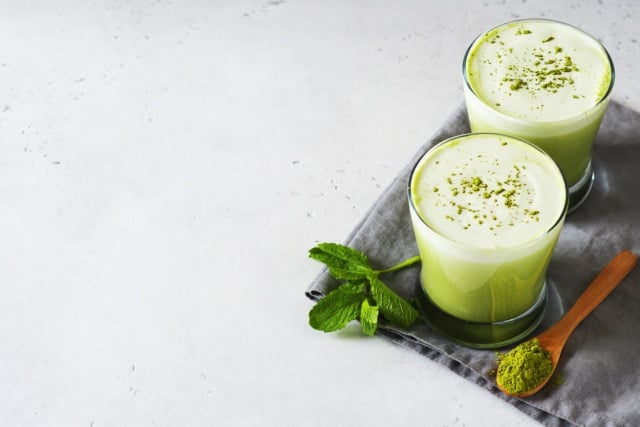
How to Make a Delicious Matcha Latte
Matcha tea latte is a wonderful treat you can buy or make at home. To make your own, you’ll want to follow our simple recipe, but add about ¾ of a cup of whole milk after the last step.
You may also wish to add some honey to taste. Whisk some more using your chasen or a small milk frother, and enjoy.
Enjoy Some Matcha Ice Cream

Enjoy Some Matcha Ice Cream
Add some matcha powder to your favorite vanilla ice cream recipe at home for a vibrant, flavorful treat.
This is most easily achieved using an ice cream maker, but you can also find simple no-churn ice cream recipes that work well without one.
Alternatively, buy some delicious ice cream from a shop. Haagen Dazs and Trader Joes make delicious varieties.
Use Matcha in Other Recipes

Use Matcha in Other Recipes
Matcha powder is great for a variety of delicious recipes. If you want to move beyond matcha tea, latte, and iced cream, you’ll find matcha a versatile and delicious ingredient.
Add it to smoothies and even buttercream frosting. The latter adds a pop of color and earthy flavors to beautiful vanilla sponge cake. Make matcha and white chocolate blondies for an antioxidant-rich treat.
Or put some matcha powder into your next batch of pancake batter for fun and healthy green pancakes.
Types Of Matcha Tea

Types Of Matcha Tea
There are two main types of matcha tea you can enjoy, whether at home or in a traditional tea ceremony. Here, we cover the differences between the two. We’ll also go into the different grades of matcha powder you can buy to make your tea.
Usucha (Thin Matcha Tea)

Usucha (Thin Matcha Tea)
Usucha is the more frequently enjoyed ‘thin’ matcha tea. It’s less concentrated than koicha. Usucha tea is also less common in Japanese tea ceremonies, which favor the thicker koicha.
Its consistency makes usucha the ideal preparation for lattes and other everyday teas. Use anything above culinary-grade matcha powder to make your usucha tea at home.
Koicha (Thick Matcha Tea)

Koicha (Thick Matcha Tea)
Koicha is also known as ‘thick tea’, resulting in a matcha tea with a consistency of syrup. It’s made using twice as much matcha per amount of hot water.
Koicha is traditionally made for a Japanese tea ceremony, and is less commonly made at home or in cafes. If you’d like to make koicha, you’ll want to invest in ceremonial-grade matcha powder.
Different Grades of Matcha Powder

Different Grades of Matcha Powder
Beyond the two kinds of matcha tea made using this healthy green tea powder, there are four grades of the powder itself. You’ll find ingredient, culinary, premium, and ceremonial-grade matcha, ranging from least to most expensive.
The latter is traditionally used for tea ceremonies in Japan. Culinary or premium-grade matcha are the best options for making matcha tea at home.
These do tend to vary more in quality than ceremonial-grade, however, so you’ll want to make sure you buy your matcha from a reputable brand.
- McFlurry Flavors. Best Flavors & Alternatives.
- Oreo Cookie Flavors. Best and Weirdest Flavors.
- Starbucks Refresher. Tips and Best Drinks.
- Jelly Belly Flavors. Best and Grossest.
- Boba Flavors. Best Flavors and Types.
- Pop Tart Flavors. Tasty Alternatives and Best Flavors.
- Almond Milk. Health Benefits and Hacks.
